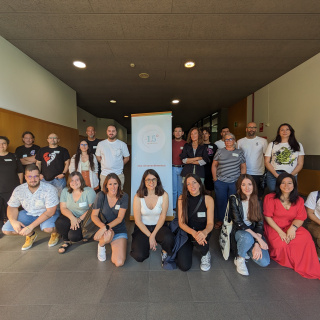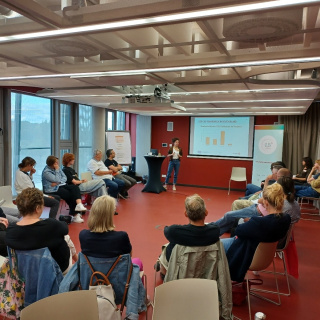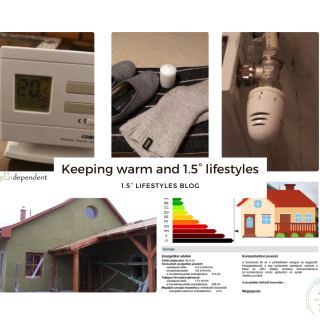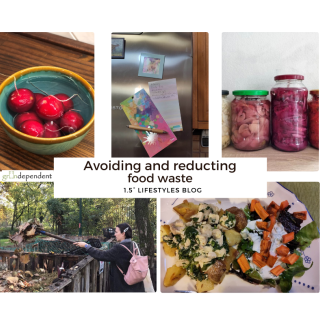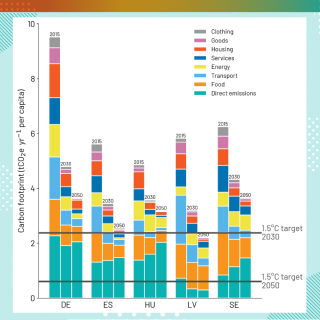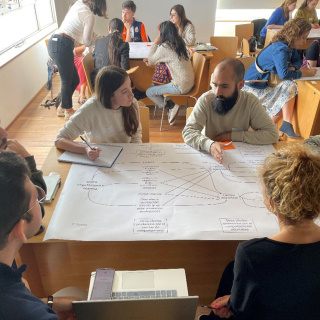Blog
Rethinking business models to support 1.5° lifestyles: Hot highlights from the experts
In recent decades, the private sector has been widely perceived as the primary sector capable of meeting human needs. This view has prevailed at the household, community and national levels. However, the pursuit of profit has led to significant inequalities in access to services, over-consumption of the Earth's resources and environmental degradation, including greenhouse gas emissions. This has raised questions about the ability of existing…
Tourism and climate justice: When are we going to take the Paris Agreement seriously?
At the end of last year, I was interviewed by the Finnish national broadcasting company YLE. They were interested in the carbon footprint of leisure flights to Finnish Lapland of 800,000 tourists per year. YLE reported a carbon footprint of approximately 600,000 tCO2e for these flights, after having consulted several research and environmental organisations.
Co-creating a Sustainable Future with Citizens to Decarbonize the Building Stock in Spain
Improving the energy efficiency of the buildings is one of the main policy objectives of the European policy initiatives, specifically, supporting the energy renovations among the existing building stock to reduce the energy consumption and the emissions. For instance, the European Commission delivered the EU Green Deal proposing a series of policy initiatives to ensure the climate neutrality by 2050 (European Commission, 2019). In the same vein…
Visions of a 1.5° Future: Citizen Responses
In order to help mitigate climate change and its associated consequences, a change in our everyday lives is imperative. But what might these changes look like in concrete terms, and what compromises are we willing to make? In our second round of citizen thinking labs, we engaged almost 100 people, across five European countries, with visions of a 2030 future. These visions involve profound lifestyle changes necessary to reduce personal carbon…
Tackling inequality for social and climate justice - Fighting for a better world in a time of worsening crises
In this blog post, Halliki Kreinin from the University of Münster/RIFS Potsdam reflects on the growth-dependence of welfare states and why it is a critical hurdle for social welfare and sustainability. To pave the way towards resilient growth-independent welfare states, our project advocates for policies that break the link between growth and well-being through redistributing wealth, combating inequality, and providing welfare outside of paid…
Keeping warm while aiming for 1.5° lifestyles – how does it work in practice? Practices and tips from the GreenDependent team
More than 60% of home energy consumption is used for heating in an average European household, thus paying attention to our heating methods and practices not only help us in pursuing 1.5° or green lifestyles, but it is also important because small changes – without major investments – can lead to big impact.[1] You may know that lowering the indoor temperature by 1-2°C can result in 6-10% energy use (and thus carbon footprint) reduction, and if…
Sustainable vs. Fast Fashion: The role of social media
In this month's EU 1.5° Lifestyles blog post, we're thrilled to have Katia Dayan Vladimirova, Senior Researcher at the University of Geneva, as our guide to the impacts of social media on our choices, behaviors, and attitudes, particularly concerning (un)sustainable ways of consuming fashion. Katia highlights the overconsumption fostered by these platforms as well as the potential, if any, that they hold as catalysts for meaningful conversations…
Avoiding and reducing food waste: this is how we do it in our GreenDependent households
Reducing the carbon footprint of our individual and household food consumption is essential to minimise food waste in our homes. Of course, this is not only important in terms of reducing our carbon footprint, but also in terms of reducing the waste of resources used to consume other discarded, unused food and drink and the associated negative environmental and social impacts. Moreover, we can do all this basically without spending extra money…
Carbon footprint chronicles: A deeper dive into the footprints of our case countries in 2015, 2030, and 2050
A previous blog post has detailed the carbon footprints for 49 countries and regions in 2015, 2030, and 2050 and how the EU 1.5° Lifestyles modelling team developed these footprint scenarios. In this post, we take a closer look at the household carbon footprints of the five case study countries of the EU 1.5° Lifestyles project.[1] The results in this post are based on our sustainable technological development scenario without lifestyle changes…
Rebounds and risks in adopting 1.5° lifestyles
The EU 1.5° Lifestyles project has explored the significant behaviour changes needed for European citizens to truly adopt 1.5° lifestyles and we have interviewed “pioneers” who have adopted low-carbon lifestyles to tell us about what has helped them and what has been challenging.




